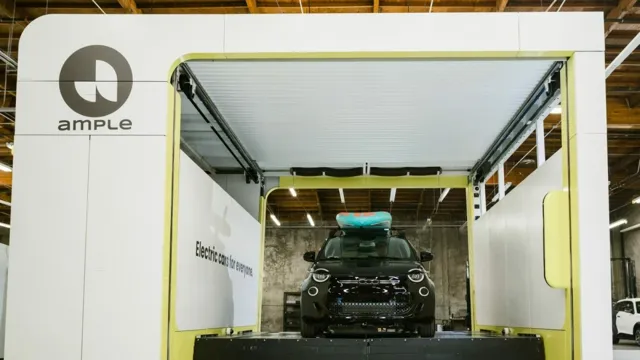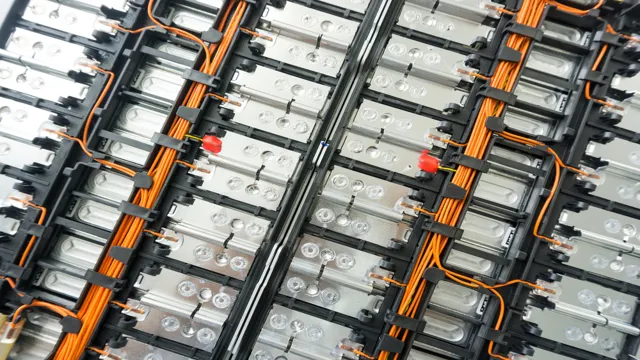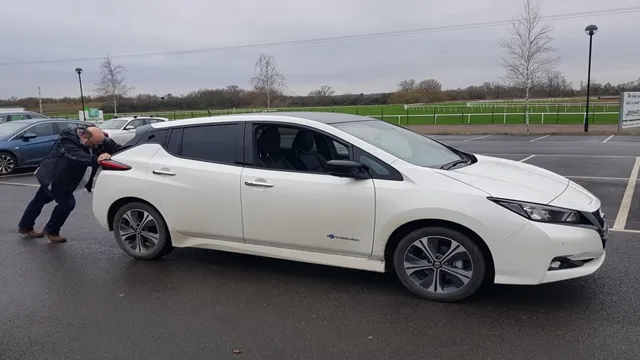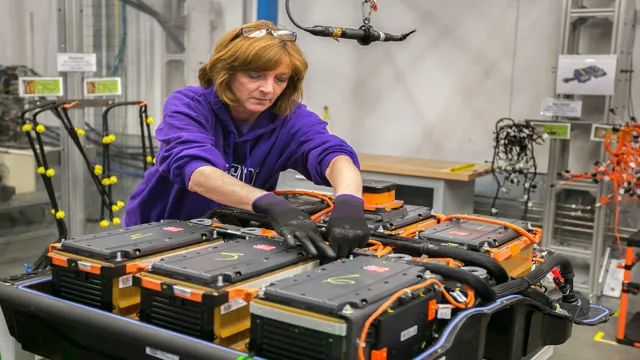Powering up: The ins and outs of batteries in an electric car
When it comes to electric cars, the batteries are the heart of the vehicle. They power the motor and provide the energy that allows the car to run on electricity alone. For many people, the thought of owning an electric car can be intimidating – particularly when it comes to the battery.
After all, how do they work, how long do they last, and what happens when they need to be replaced? In this blog, we’ll break down the basics of electric car batteries and give you an understanding of how they work and what you need to know to make an informed decision about going electric. So, buckle up and let’s dive in!
What are Electric Car Batteries?
Batteries are the main power source used in an electric car. They store electricity which is used to power the electric motor of the vehicle. Unlike gasoline cars, electric cars rely solely on battery power to move.
These batteries are rechargeable and typically made of lithium-ion technology. A big advantage of electric car batteries is that they produce zero emissions, unlike fossil fuels that emit harmful pollutants. They also require less maintenance and are more energy efficient.
One major challenge with batteries in electric cars is their limited range. However, with advancements in technology, the battery range of electric cars is getting longer. Electric car batteries are an essential component in the rise of sustainable transportation, and their development is key to the continued success of this revolution.
Composition and Types
Electric car batteries are a critical component that powers electric vehicles. Unlike traditional gasoline-powered engines, electric cars rely on rechargeable batteries to provide energy for the motor. These batteries are usually made up of lithium-ion cells, which are lightweight and highly efficient.
The batteries pack together in modules that are connected to an electronic battery management system that controls charging and discharging. They typically have a lifespan of around 100,000 miles and must be replaced after they no longer hold a charge. Unlike gasoline engines, electric vehicles can be charged at home, at charging stations, or on the go using mobile charging units.
So the next time someone asks you how electric cars work, you can tell them that they run on high-tech batteries that are lighter, more energy-efficient, and have a low environmental impact compared to their gas-guzzling counterparts.

How They Work
Electric car batteries are the power source that allows electric vehicles (EVs) to move. These batteries are rechargeable and store electrical energy, which is then used to power the car’s electric motor. The most common type of electric car battery is the lithium-ion battery, which is made up of a series of cells stacked together.
These cells contain a cathode, an anode, and an electrolyte. When the battery is charged, the lithium ions move from the cathode to the anode, creating an electrical current. This current is then used to power the electric motor, which drives the wheels of the car.
The capacity of electric car batteries is measured in kilowatt-hours (kWh), which determines how far the car can travel on a single charge. The higher the kWh rating, the further the car can travel. As technology continues to improve, electric car batteries are becoming more affordable and efficient, making EVs a more practical choice for environmentally conscious drivers.
Benefits of Electric Car Batteries
Electric cars are becoming more and more popular as people become increasingly environmentally conscious. One of the main reasons for this is the batteries in an electric car, which provide numerous benefits. Compared to traditional gasoline-powered cars, electric car batteries are not only cleaner but also more efficient.
They last longer and require less maintenance, which ultimately leads to reduced costs for drivers. Additionally, they can recharge using renewable energy sources like solar power. Furthermore, the batteries can be used to store energy from the grid during off-peak hours and then used to power the car during peak hours.
Overall, using batteries in an electric car is not only environmentally friendly but also a more practical and cost-effective solution.
Environmental Impact
Electric car batteries can have a significant environmental impact. Firstly, they have a much lower carbon footprint compared to traditional gasoline-powered vehicles as they produce zero emissions. Secondly, electric car batteries have the potential to store renewable energy that can be used during peak times when the demand for energy is higher.
This reduces the need for fossil fuels to power our cities and ultimately reduces our carbon footprint. Additionally, electric car batteries can be recycled, which helps to minimize waste and the depletion of natural resources. By using electric car batteries, we can contribute to a healthier planet while also benefiting from lower fuel costs and reduced dependence on fossil fuels.
It’s a win-win situation for both the environment and our wallets!
Lower Maintenance Costs
One of the primary benefits of electric car batteries is lower maintenance costs. Unlike gasoline-powered vehicles that require frequent oil changes and tune-ups, electric cars have fewer moving parts and require very little maintenance. Electric car batteries also have a longer lifespan than traditional car batteries, meaning less frequent replacements and associated costs.
While there may be initial sticker shock when purchasing an electric car, the long-term savings in maintenance costs make it a financially smart choice. Plus, with the rise of renewable energy, charging an electric car is becoming increasingly affordable and environmentally friendly. It’s like choosing a low-maintenance houseplant over a high-maintenance one – it may cost a bit more upfront, but it pays off in the long run with less upkeep and a healthier environment.
Challenges and Limitations
One of the biggest challenges facing electric cars is the limitations of battery technology. While electric car batteries have come a long way in recent years, they still have a long way to go before they can match the range and convenience of traditional gasoline-powered vehicles. One of the main limitations of batteries in an electric car is their energy density, which is still significantly lower than the energy density of gasoline.
This means that electric cars require much larger and heavier battery packs than gasoline cars, which can be expensive and impractical. Additionally, recharge times for electric car batteries are still much longer than the refueling times for gasoline cars, which can be a significant drawback for consumers. However, despite these challenges, the benefits of electric cars, such as reduced emissions and lower operating costs, make them an increasingly popular and important part of the automotive industry’s future.
Limited Range
The limited range is one of the biggest challenges and limitations faced by electric vehicles (EVs). Unlike traditional gas-powered cars that can travel up to 400-500 miles on a full tank, EVs usually have a range of 100-300 miles. While this is sufficient for daily commutes, it can be a hindrance for longer trips, requiring drivers to plan charging stops along the way.
Additionally, the range can be affected by factors such as weather conditions, driving habits, and battery degradation over time. However, advancements in technology are continuously being made to improve the range of EVs and make them a more viable option for all drivers. With the incorporation of more efficient batteries and faster charging stations, the limitations of the limited range may soon be a thing of the past.
Cost and Availability
When it comes to implementing new technologies, cost and availability are two major challenges that businesses face. Some technologies may seem too expensive to implement, while others may not be readily available in certain regions or industries. These limitations can hinder progress and innovation, making it difficult for businesses to keep up with the constantly evolving market.
However, it’s important to remember that these challenges can also present opportunities for creativity and problem-solving. For instance, businesses can explore alternative solutions or partner with other companies to share resources and reduce costs. By embracing these challenges and working to overcome them, businesses can stay competitive and push the boundaries of what’s possible in their industry.
Future of Electric Car Batteries
Batteries in an electric car play a critical role as they determine the distance an electric car can travel on a single charge. Today, several types of batteries power electric cars, including nickel-metal hydride (NiMH) and lithium-ion (Li-ion) batteries. However, there is ongoing research and development in the area of electric car batteries.
The future of electric car batteries looks promising as companies explore innovative ways to increase battery efficiency and reduce costs. One such development is the solid-state battery, which could become the future norm for electric cars. Solid-state batteries are safer, have faster charging times, higher energy density, and longer lifespan compared to the current Li-ion batteries.
With more significant investments pouring into electric vehicle technology, we can expect to see a lot of advancements in the near future.
Advancements in Battery Technology
The future of electric car batteries is looking bright, as advancements in technology are making them more efficient and reliable. One major development is the use of solid-state batteries, which use a solid electrolyte instead of the liquid electrolyte found in traditional batteries. This makes them safer and more energy dense, meaning they can store more energy per unit of weight.
Another innovation is the use of silicon anodes, which can replace the graphite anodes found in current lithium-ion batteries. Silicon has a higher energy density and can store more lithium ions, making for a more powerful and longer-lasting battery. With these developments, electric cars will be able to travel further on a single charge and charging times could be reduced significantly.
Overall, the future of electric car batteries is looking promising and could be a game-changer in the world of sustainable transportation.
Impact on the Automotive Industry
The future of electric car batteries is a topic of great interest to the automotive industry, as it will have a significant impact on the way we use and power our vehicles. Advances in technology have already led to the development of high-capacity batteries that can provide both power and range to electric vehicles. These batteries are becoming smaller and lighter, with longer life spans and increased efficiency, making them more accessible to the market.
As more people switch to electric vehicles, the demand for these batteries will continue to grow, leading to increased research and development in the sector. The competition to create the ultimate electric battery is fierce, with manufacturers vying to be at the forefront of the industry. With all these developments, the future of electric car batteries looks both promising and exciting, and it will be interesting to see what new innovations will come next.
Conclusion
In conclusion, batteries in an electric car are the powerhouse behind the quiet hum of a revolution in transportation. With rechargeable electric energy, these batteries offer a more sustainable, cost-effective, and practical solution to traditional fossil fuel-based vehicles. They may not be perfect, but with continued innovation and development, the sky is the limit for the future of batteries in electric cars.
Who knows, maybe soon we’ll be seeing electric cars zipping around with some seriously impressive mileage…
and all thanks to the little battery that could.”
FAQs
What type of batteries are used in electric cars?
Most electric cars use lithium-ion batteries because they are energy-dense and provide a long range.
How long do electric car batteries last?
The lifespan of an electric car battery varies, but most manufacturers offer a warranty ranging from 8 to 10 years.
Can you recharge an electric car battery while driving?
Some electric cars have regenerative braking, which allows the battery to recharge when the car slows down. However, you cannot fully recharge the battery while driving.
How expensive is it to replace an electric car battery?
The cost of replacing an electric car battery varies depending on the make and model of the car, but it can range from $3,000 to $10,000.





